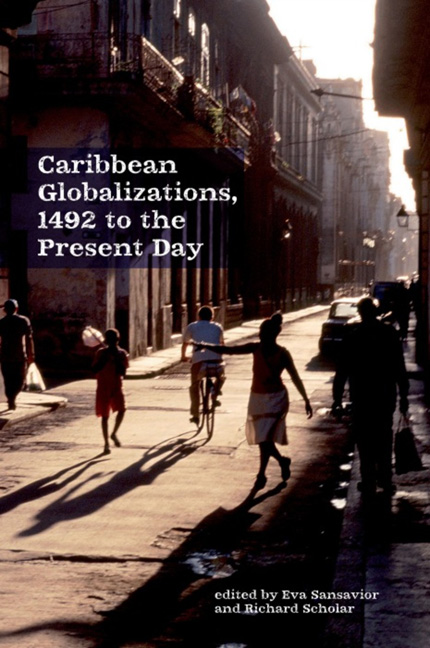Book contents
- Frontmatter
- Contents
- Contributors
- Prologue: Globalization, Globality, Globe-Stone
- Introduction
- I Globalizations in the Making
- II The Complex Present
- 6 Tobacco: The Commodification of the Caribbean and the Origins of Globalization
- 7 The Amaranth Paradigm: Amerindian Indigenous Glocality in the Caribbean
- 8 Aluminium: Globalizing Caribbean Mobilities, Caribbeanizing Global Mobilities
- 9 Race and Modernity in Hispaniola: Tropical Matters and Development Perspectives
- 10 Local, National, Regional, Global: Glissant and the Postcolonial Manifesto
- 11 Tropical Apocalypse: Globalization and the Caribbean End Times
- Acknowledgements
- Index
9 - Race and Modernity in Hispaniola: Tropical Matters and Development Perspectives
from II - The Complex Present
- Frontmatter
- Contents
- Contributors
- Prologue: Globalization, Globality, Globe-Stone
- Introduction
- I Globalizations in the Making
- II The Complex Present
- 6 Tobacco: The Commodification of the Caribbean and the Origins of Globalization
- 7 The Amaranth Paradigm: Amerindian Indigenous Glocality in the Caribbean
- 8 Aluminium: Globalizing Caribbean Mobilities, Caribbeanizing Global Mobilities
- 9 Race and Modernity in Hispaniola: Tropical Matters and Development Perspectives
- 10 Local, National, Regional, Global: Glissant and the Postcolonial Manifesto
- 11 Tropical Apocalypse: Globalization and the Caribbean End Times
- Acknowledgements
- Index
Summary
Santo Domingo! The oldest European city in the Western Hemisphere! The cradle of that extraordinary movement of European or Old World energy and pioneering, which, having begun nearly four hundred years ago, has been sweeping across the Atlantic. Here at any rate was the beginning, here was the dawn of the new era of civilization and progress.
Nathan Appleton, ‘Santo Domingo City’, Bulletin of the American Geographical Society 23.4 (1891): 533The tropics today are often still described implicitly as impoverished spaces; as ‘less developed’ and ‘non-white’, or as places that exist simply as the ‘West's Other’ (Driver and Yeoh, 2001; Driver and Martins, 2005). While globalization theories have primarily run counter to regional synthesis or area studies, the Caribbean as a socio-spatial perspective and geopolitical entity nevertheless retains significance. This chapter assesses the ways in which critical perspectives of the Caribbean during the twentieth century have been shaped by notions of tropicality, linked directly to assumptions surrounding modernization and latterly globalization. Tropical geography as an intellectual perspective, despite previously being allied closely with colonial definitions of, and policies for, economic development provides a useful framework through which to position the globalized Caribbean. From late nineteenth-century and twentieth-century prejudicial concepts of the ‘tropics’, as delivered by Appleton and his colleagues, current perspectives recognize the importance of the term as a conceptual and not just a physical space (Power and Sidaway, 2004). By unravelling narratives of the Caribbean as a tropical region, placing a specific focus on the island of Hispaniola, the chapter analyses how these islands have been defined as unique and distinctive spaces during the last century, and then employs the progressive elements of this legacy to question assumptions that the region has become dominated by global economic and cultural trends. In assessing the role of globalization, this critical analysis of the Caribbean as part of the ‘tropics’ thus explores the previously privileged epistemologies, enduring metaphors, and beliefs that have shaped representations of the region, but which have been challenged in order to redefine societies today.
- Type
- Chapter
- Information
- Caribbean Globalizations, 1492 to the Present Day , pp. 203 - 226Publisher: Liverpool University PressPrint publication year: 2015

